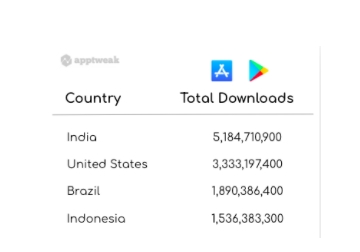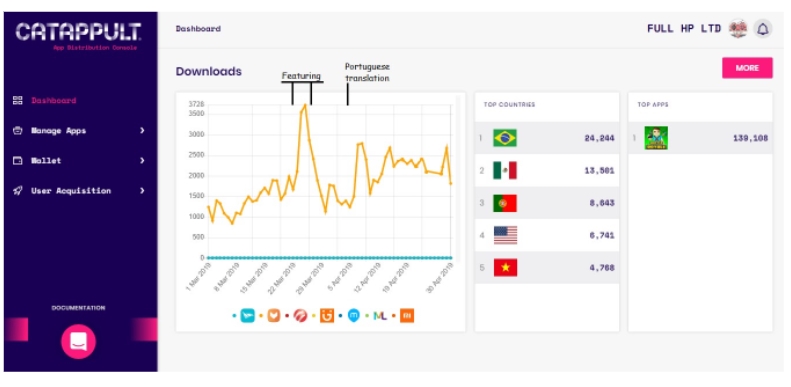Brazil’s mobile games market is strong and developing rapidly, and offers enormous potential for developers looking to enter the market.
Brazil can boast of having one of the top rankings in downloads from Google Play and App Store (where it comes in third, just after India and the United States).
In this article, we’ll discuss what types of games and apps Brasileiros download most and offer ideas to developers about how to adapt their games to that market and promote it to Brazilians.
1. Why Brazil is a promising market
In recent years, Brazil, like other Latin American countries, has experienced superfast technological growth. Brazil is a larger market than Mexico in both Google Play and App Store, making it the first in Latin America by mobile game downloads.
With a population of 212 million people, of whom 81% currently have a smartphone (and of whom 88% will have one by 2025), Brazil is the third country in the world by total downloads from App Store and Google Play.

Total number of downloads for the Top 10 countries (Estimates from Top 500 apps from the category “all”, January to June 2019, Apple App Store and Google Play Store). Source: Apptweak
According to Statista, the Brazilian mobile games market revenue is projected to reach $380 million in 2020. The expectation is that by 2025, the market revenue will be $450 million.
2. Who’s playing and how?
According to Newzoo, Brazilians spend roughly $1.5 billion per year on games (of which $380 million on mobile games in 2020, with over 60 million users), making Brazil the 13th games market in the world (and first in Latin America).
The vast majority of Brazilians are using Android, Google Play is by far the most popular store, beating the App Store by a huge margin. Some of the other stores used in Brazil are Aptoide (available for Android) and Baixaki (a leading website for games downloads, with apps for both Android and iOS).
Action, strategy and role playing games are the popular types of games in Brazil. Also, Brazil is the 3rd largest esports market in the world.
3. Adapting to Brazilian reality
Brazilians love using social networks and messengers: Facebook, Twitter, Instagram, Whatsapp. Try to create fun content like contests and promotions and encourage them to share it with friends. Take advantage of YouTube where Brazilians spend a lot of time watching local content and promote your game through local influencers. Here is one of the popular game influencers in Brazil: João Sampaio and his YouTube channel Flakes Power.
A good way to appeal to Brazilian audience is offering promotions and special offers in your mobile games as many Brazilians say that they love great deals and smart purchases. Don’t forget to localize the prices and convert them to Brazilian reais (R$).

Another remark about adapting to Brazilian reality is that Brazil is located in the Southern hemisphere, so the winter months are very hot while the weather in June, July and August can be chilly. Keep that in mind while referring to the weather during seasonal holidays and events.
4. Speaking the users’ language
Brazilians decidedly want their games in Portuguese, as only 5% of them speak proficient English. Thus if you’re wondering whether you need to have your app translated to Portuguese, the answer is clear — if you don’t, you’ll be missing the majority of Brazilian players.
It’s important to remember that it should be Brazilian Portuguese, not European Portuguese. They are different both in terms of pronunciation and vocabulary. “You” is você in Brazilian Portuguese, but tu in European Portuguese. Rapariga means “girl” in Portugal, but in Brazil it can mean… “prostitute”. Watch out for the confusion such differences can cause.
Past experience has shown that ASO that is suitable for the Portuguese market will fail in Brazil, and vice versa. You can read more about it in this article.
Portuguese words are in general 25-30% longer than English words, so when building interface elements, it’s generally a good idea to plan for extra space. This is especially valid for short strings (menu items, UI, etc.).
To localize the game and translate the store pages and other marketing materials, you can use Nitro, a professional translation service which will translate or proofread your text within record time (often just a few hours).
On Nitro, you can choose the preferred version of the language: Brazilian Portuguese vs. European Portuguese. Remember: Brazilians would find the “wrong” version distracting at best, irksome at worst.

5. Mobile games that gained big success in Brazil
Our clients Full HP shared with us an interesting story about how their mobile shooter Mad GunZ gained success among the Brazilian audience. When they released Mad GunZ on an alternative platform, Catappult, the game had only been localized into English.
They got featured (the largest jump on the screenshot), but soon after that the numbers dropped back. Since most of the players were from Brazil, Full HP localized the game and the app page into Brazilian Portuguese, and this resulted into the numbers climbing again.

Another client of ours, family development platform Wachanga, states that Brazilian users are very active and happy to provide feedback and ideas for ways to improve. So we encourage you to try to win over this promising audience!
In conclusion
While the Brazilian mobile games market cannot be compared to that of, for example, China, it’s still a growing market with a lot of potential for developers.
Remember that Brazilians love multiplayer games, and that the vast majority will download these on Google Play.
Since the vast majority of Brazilians speak only Portuguese, be sure to localize your app and relevant marketing. Use native-speaking translators, like those at Nitro who offer professional translation services, and remember to ensure that the translation is into Brazilian rather than European Portuguese.
Finally, remember that Brazil’s mobile games market is still growing — Brazilian players have proven willing to pay for their games, and with more than two-thirds of players in the medium and high income category, you can expect the ARPPU (average revenue per paying user) will keep rising.

About the author
Alex Murauski
Alex is CEO of Alconost Inc., a global provider of translation and localization services for apps, games, and websites into 70+ languages. Alconost can help set up continuous localization and linguistic testing. For shorter texts, Alconost offers Nitro, a professional human online translation platform.





